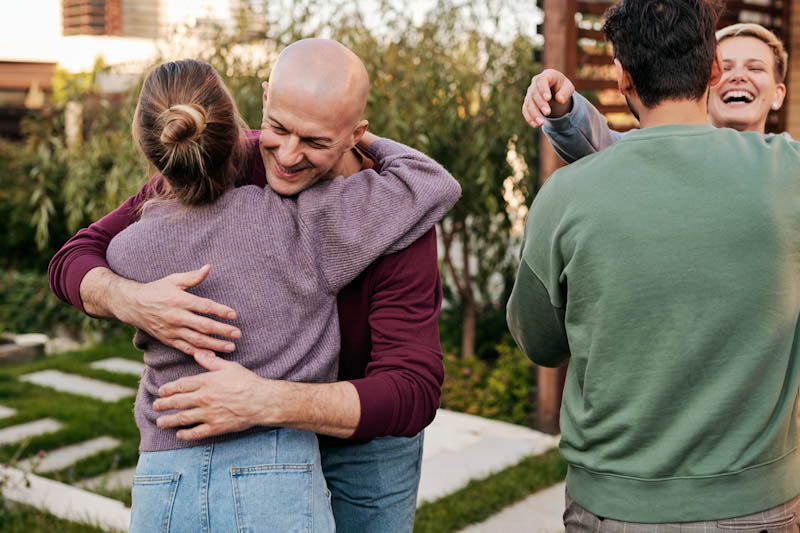What Happens After an Intervention?
Your loved one agreed to get treatment for addiction during their intervention — or not. Here's what you need to know about what comes next

An intervention on a loved one for their drug or alcohol use is an enormously emotional experience for everyone involved. But now you’ve done it. The outcome you’d hoped for happened: The person accepted help! You breathe a sigh of relief, knowing you’ve helped them start on the path toward a fresh life in recovery.
But this is only the beginning, for both you and your loved one. The coming months will be full of beautiful moments — and aggravations. You’ll want to make sure your family member or friend gets care and support through the early days of detox and addiction treatment. They, in turn, will need your encouragement and understanding while building a healthy sober life.
(Backing up for a second: If you haven’t held an intervention yet but think a loved one may need it, please read more about the intervention process and connect with our clinically trained interventionists.)
First things first: Just as there were steps to take before and during the intervention, there are set steps you can take after. And remember, there’s only so much you can do now. You have given your loved one the chance to get their life back, but they also have to want it. Whatever happens, you have to keep loving and taking care of yourself along the way. Now, here’s what you can do and expect in the aftermath of the intervention.
They Accepted Help! What Comes Next?
After your loved one has said that they are willing to accept help, your intervention specialist will help you with the next steps. You will have planned out a road map for this process in advance, and the interventionist will be a steady hand to keep everything on track.
Go through the next steps with them and start checking off the boxes one by one. Remember, after a person says yes, the window in which they’re willing to commit to that decision can be very small. So, work closely with the interventionist and work as though time is of the essence because, in many cases, it is.
The First Steps After an Intervention
These moments, between the intervention room and the addiction treatment center, can be hectic and intense, but your intervention professional will help you and your loved one get to the door of that treatment facility.
The first steps after the intervention closes involve a lot of logistics, a lot of reassurance, a lot of support and sometimes a little convincing on your part. Your loved one may second-guess their decision as the “finality” of their choice begins to sink in. In many cases, the person still has substances in their system. As the effect of that begins to diminish, they may become distressed or feel the onset of withdrawal.
This is where your emotional support comes in. Tell them that they’ve got this, that everything is going to be OK. They have put their trust in you and followed your plea to do something that’s both unfamiliar and overwhelming, so try to make them feel comfortable.
Most likely, you’ll have packed some of the things they’ll need during detox and inpatient treatment already. Now, as you help them grab a few final things, assure them that all their everyday nitty-gritty like paying bills or loose ends at work are nonissues at the moment. Recovery is paramount.

Understanding the Detox Process After an Intervention
The person’s physical safety is important now, and people who haven’t experienced addiction may not understand withdrawal from drugs and alcohol. Withdrawal, especially in cases of severe alcohol or benzodiazepine use, can be dangerous — even deadly. Many people heading to treatment are physically or emotionally dependent on a substance.
Counterintuitive as it may seem, they may actually need to keep using for this short time, either to stay safe or motivated to follow through.
If this is the case, it is critical that the intervention specialist, in conversation with the planned recovery center, handle this aspect. This is both to ensure your loved one’s safety and to make sure they meet any sobriety requirements the treatment center may have.
Whether the person needs to maintain a level of use in their system or not, the next step is to get your loved one checked into a medically supervised detox. There, they will have the chance to detoxify safely.
We want to be absolutely clear on this point: Detoxing without professional help is very often dangerous. It is a much more emotionally, mentally and physically taxing process than with medical supervision, and in some cases, it can lead to fatal complications (again, especially with alcohol and benzodiazepine use disorders). Your intervention specialist will make sure all of this is handled with care.
Starting Inpatient Treatment
Detoxing in a clinical recovery setting is usually necessary, but it has other advantages as well. The transition from detox to inpatient treatment is more seamless. Most detox wards are either in the same location as inpatient treatment centers or they have a direct connection to them.
In many cases, the inpatient program — the first step of rebuilding one’s life — actually begins during the detox process.
The inpatient program is where your loved one will begin to work within a comprehensive recovery structure. Here, 12-step recovery programs may be introduced, individual psychotherapy sessions like cognitive behavioral therapy (CBT) may begin or group therapy sessions may be held.
Depending on the treatment center and your loved one’s needs, the program will be adjusted, amended and supplemented as necessary until it is time for the next step.
Transitioning to Outpatient Treatment
Your loved one is making great progress! Let’s talk about you for a minute. You may need care, resources and support as well while your loved one is going through their recovery process.
This is absolutely normal. Addiction is a “family and friends disease” — it impacts an orbit of folks around the person going through it. So you deserve to be supported too, in order to best support your loved one. Consider individual therapy with a specialist or community meetings for friends and family of people in recovery.
Once your loved one completes their inpatient treatment, they’ll most likely be discharged into a less intensive outpatient program. They’ll learn more tools for a successful sober life, pick up their day-to-day responsibilities and begin to comfortably and confidently get back into their (and your) lives.
What if an Intervention Fails?
The reality is that not all interventions succeed the first time, or even subsequent times. Remember that it’s no one’s fault if things shake out this way. As people in 12-step recovery say, “Addiction is cunning, baffling and powerful.”
However, if an intervention does not take, whatever consequences and boundaries that you set in advance must be enacted and maintained. This will most likely feel difficult, but enabling addictive behaviors does more harm than good.
You should also try not to despair. Addiction grips tightly, and recovery is not linear. You may find that your loved one becomes more willing to accept help once your boundaries are in place, or they may be more receptive in another moment, for their own reasons. Staging another intervention might be the right move, but it doesn’t always come to that.
A Road Without an End
We have articles and resources all over the All Sober website that discuss the recovery journey after an intervention. You and your sober loved one can read up, continue counseling, become active in recovery communities and more.
Recovery is a road without an end. That’s actually a good thing. It means that there’s endless opportunity for forward momentum and growth. There will be moments to celebrate, and there will be roadblocks. Don’t get frustrated and don’t give up. No matter what happens, keep looking forward, and keep your head held high.
Soon enough, you’ll be able to share the joys of sober life together.
We’re here to help you get there. You can call 1-866-417-6237 or contact us here to learn more about the intervention process from a trained clinician — and to start your journey.
More Help & Information
Does the 'Pink Cloud' of New Sobriety Help or Hurt? It's Complicated
The euphoria of early recovery may be fleeting, but long-lasting balance is the goal. Here's how to keep your head up through the process and handle reality with confidence.
Sobriety vs. Recovery: What's the Difference?
Are the concepts themselves up for debate? Do they require certain treatments, or abstinence from everything? It's complicated! And new ways of thinking are changing the conversation.
Now Elite NFL Players, They First Tackled Addiction | News Roundup
All Sober compiles the best of the latest headlines. Here's your addiction and recovery news for the week of Feb. 19, 2024!
Help Them Help You: Explaining Your Mental Health to Your Family
Your mental health can affect — and be affected by — your loved ones. Here's how to discuss it with them so everyone can heal.
Dry January (and Beyond): The Possibilities Are Endless
There's never been a better time to go sober. Whether you're trying it out this month or already living the life, join us for some tips, ideas, inspiration — and maybe even new friends.
Sober Holiday Tips: Meeting 'Share-a-Thons'
Need to get out of the house for a bit and see some friendly sober faces? Recovery support group meeting marathons run 24/7 from Christmas Eve through New Year's Day.
We're in This Together: Building a Healthy Sober Support Network
You are the captain of your recovery, but you don't have to do it alone. A sober support network will lift you up in tough times and celebrate your triumphs.
Real-Life Recovery Tips: Phone a Friend
When you're traveling, you can take your sober support network with you — right in your pocket. Rocker Kasim Sulton shares his top recovery tip in this video.











